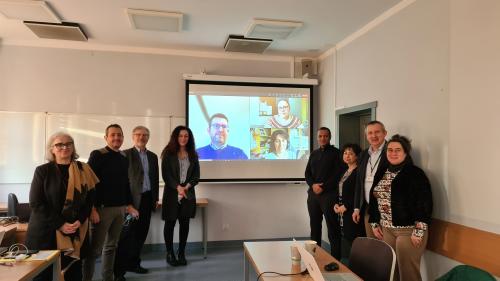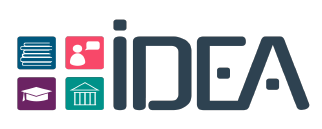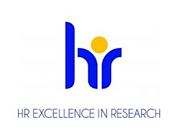-
Partager cette page
- Entrepreneurship,
- International,
IDEA European Project
Published on April 19, 2023 – Updated on April 19, 2023

As part of the 5th transnational meeting of the European Partnership Project on “Inclusive Digital Education Access” (IDEA), the University of Poznan hosted the various European partners for a two-day event on 19 and 20 January 2023.
Jean Moulin Lyon 3 University was represented on site by Alida Sahli, administrative coordinator of European and international projects, and remotely by Marion Del-Bove, the project’s educational coordinator.
The first day, led by the EFMD, provided an opportunity to review the progress of the different stages of the project, including the future platform and the strategy for the project’s operation and sustainability after the end of the funding period.
The second day allowed the partners to discuss their various contributions, to share the tools and resources they find useful for organising their own events, and to consider ideas for continuing the collaboration. In this perspective, a new partnership is envisaged on the theme of refugees, following the war in Ukraine.
About the project
The COVID pandemic changed teaching rules overnight and the “new normal” will be with us for a long time, with no easy way back to the previous state of affairs. The transition to online teaching and learning took place as a matter of urgency. However, it raised important issues: teaching staff were insufficiently prepared and the process was not sufficiently adapted to students’ needs. The direct consequences were a fall in student engagement and participation, a higher drop-out rate, and increased difficulties for the most vulnerable students.
Teaching staff need guidance to develop/deliver high-quality digital teaching to ensure that students remain at the centre of the learning and teaching process. The project will develop a quality framework for digital education with a focus on inclusion.
Teaching staff need reference material, guidance, tools and self-study materials to improve the quality of their digital teaching. The project will offer all the necessary resources (main findings on expectations, best practices (do’s and don’ts), quality framework with recommendations on how to integrate it into courses, self-assessment tools/checklists, etc.).

The first day, led by the EFMD, provided an opportunity to review the progress of the different stages of the project, including the future platform and the strategy for the project’s operation and sustainability after the end of the funding period.
The second day allowed the partners to discuss their various contributions, to share the tools and resources they find useful for organising their own events, and to consider ideas for continuing the collaboration. In this perspective, a new partnership is envisaged on the theme of refugees, following the war in Ukraine.
About the project 
The COVID pandemic changed teaching rules overnight and the “new normal” will be with us for a long time, with no easy way back to the previous state of affairs. The transition to online teaching and learning took place as a matter of urgency. However, it raised important issues: teaching staff were insufficiently prepared and the process was not sufficiently adapted to students’ needs. The direct consequences were a fall in student engagement and participation, a higher drop-out rate, and increased difficulties for the most vulnerable students.Objectives
The project aims to present the lessons learned from this development and to analyse what has worked, and what has not, from the perspective of students and teaching staff.Teaching staff need guidance to develop/deliver high-quality digital teaching to ensure that students remain at the centre of the learning and teaching process. The project will develop a quality framework for digital education with a focus on inclusion.
Teaching staff need reference material, guidance, tools and self-study materials to improve the quality of their digital teaching. The project will offer all the necessary resources (main findings on expectations, best practices (do’s and don’ts), quality framework with recommendations on how to integrate it into courses, self-assessment tools/checklists, etc.).

Last updated: April 19, 2023

